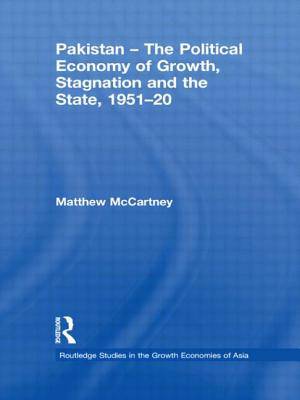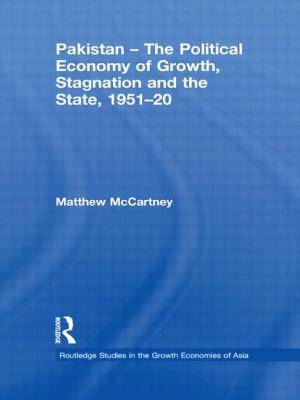
- Afhalen na 1 uur in een winkel met voorraad
- Gratis thuislevering in België vanaf € 30
- Ruim aanbod met 7 miljoen producten
- Afhalen na 1 uur in een winkel met voorraad
- Gratis thuislevering in België vanaf € 30
- Ruim aanbod met 7 miljoen producten
Pakistan - The Political Economy of Growth, Stagnation and the State, 1951-2009
Matthew McCartneyOmschrijving
This book provides a comprehensive reassessment of the development of the economy of Pakistan since independence to the present. It employs a rigorous statistical methodology, which has applicability to other developing economies, to define and measure episodes of growth and stagnation, and to examine how the state has contributed to each. Contesting the orthodox view that liberalisation has been an important driver of growth in Pakistan, the book places the state at the centre of economic development, rather than the market. It examines the state in relation to its economic roles in mobilising resources and promoting a productive allocation of those resources, and its political roles in managing the conflict inherent in economic development. The big conclusions for economic growth in Pakistan are that liberalisation, the market and the external world economy in fact have less influence than that of the state and conflict. Overall, the book offers analyses of the different successive approaches to promoting economic growth and development in Pakistan, relates these to medium-term economic outcomes - periods of growth and stagnation - and thereby explains how the mechanisms by which the state can better promote growth and development.
Specificaties
Betrokkenen
- Auteur(s):
- Uitgeverij:
Inhoud
- Aantal bladzijden:
- 264
- Taal:
- Engels
- Reeks:
Eigenschappen
- Productcode (EAN):
- 9780415728249
- Verschijningsdatum:
- 29/10/2013
- Uitvoering:
- Paperback
- Formaat:
- Trade paperback (VS)
- Afmetingen:
- 156 mm x 233 mm
- Gewicht:
- 489 g

Alleen bij Standaard Boekhandel
Beoordelingen
We publiceren alleen reviews die voldoen aan de voorwaarden voor reviews. Bekijk onze voorwaarden voor reviews.











